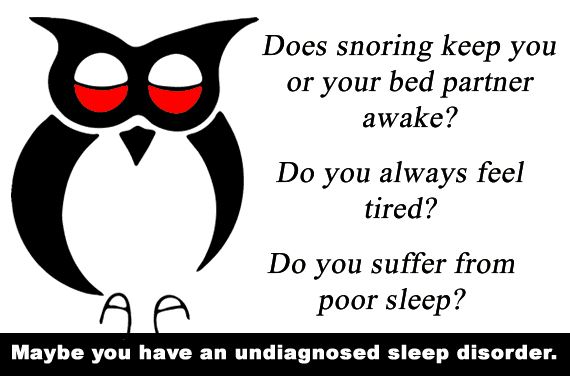
Are you always tired or sleepy during the day ?
Do you suffer from poor sleep?
Does snoring keep you or your bed partner awake?
Do you always feel tired?
Do you fall asleep during the day?
See this page for more questions…
Sleep disorders adversely affect quality of life, efficiency, health and safety.
It is important that if you answer yes to any of these questions, you consult your doctor to discuss the possibility that you may have a sleep disorder such as sleep apnea that needs diagnosis and treatment.
Sleep Apnea (Apnoea)
Apnea means absence of breath. Obstructive sleep apnea (often just called sleep apnea, or sometimes OSA) occurs when the airway collapses during sleep and the person stops breathing. The person with sleep apnea may have hundreds of these episodes throughout the night, disrupting their sleep and starving the body of vital oxygen. Fortunately an effective treatment is available which will allow the person to lead a normal healthy life. Obstructive sleep apnea affects more than 5% of the population and is the result of an obstruction to the airway, usually as the result of a narrow airway collapsing or becoming blocked when muscles relax during sleep.
Symptoms of Sleep Apnea
People with obstructive sleep apnea usually snore loudly and have restless sleep. Often these symptoms are not noticed by the person with sleep apnea, but by their partner or work colleague, who may also notice frequent pauses in breathing and snoring, lasting between 10 seconds and a minute. Each pause ends with a deep gasping noise and brief awakening as the person struggles to breathe, although the person doesn’t usually remember awakening. As a result of the problems during sleep, the person with sleep apnea is usually very tired during the day, and as the day progresses, they may struggle to stay awake. The tiredness can affect the person’s ability to concentrate and to function well at work, and it can be extremely dangerous if they become sleepy while driving or operating heavy machinery. Other symptoms which occur in untreated sleep apnea include depression, irritability, personality changes, impotence, memory impairment and increased frequency of urination at night.
Who Gets Sleep Apnea?
Sleep apnea can occur at any age. In childhood, it is commonly the result of enlarged tonsils or adenoids or of some cranio-facial abnormality. In adulthood, it occurs more often in middle age, and is more common in men than in women. It is often associated with being overweight, particular with excess fatty tissue around the neck. In people not overweight, it is likely that they have been born with a narrow airway, or a facial structure which leads to narrowing. Almost everyone who has obstructive sleep apnea will snore, as snoring is also the result of narrow or floppy upper airways.
Sleep Disorders Australia (SDA)
Sleep Disorders Australia (SDA) is a voluntary group offering assistance and support to those persons and their families who are living with sleep disorders throughout Australia.
SDA has a free information booklet which can be posted out to you, or downloaded from the SDA website.




